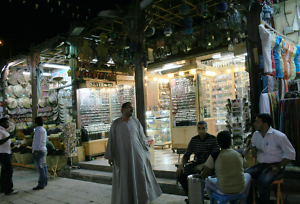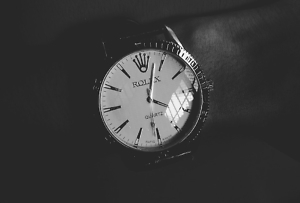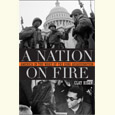Taken
I had no idea my father was capable of such complex treachery
In over 30 years of travel abroad, I’ve had ample opportunity to haggle for things in exotic markets. I’ve traded with Masai tribesmen in the Ngong Hills of Kenya, purchased gold in Dubai, and bartered for antique muskets in Kabul. I’ve dealt with arms dealers in Abu Dhabi, relic merchants in the jungles of Ecuador, and peddlers of ancient coins in the rain-soaked alleyways of Tashkent, Uzbekistan. There are markets in Nepal where you can tell someone that you have a king cobra in a burlap bag that you want to trade for a South African grenade launcher and you’ll be taken quite seriously indeed.

During these opportunistic forays into the world’s commercial underbelly, I’ve been tear-gassed, chased by an angry mob, and held for an uncomfortable afternoon in a rather dank holding cell, accused of being a German spy. At a souk in Yemen, I once found myself staring down the barrel of an AK-47 assault rifle due to an unfortunate misunderstanding completely unrelated to commerce or tourism. Sometimes, when you patronize shady markets in exotic locations, you get just a little more than you bargained for.
Indiana Jones moments like these are, however, the exception rather than the rule. Mobs, riot agents, and gunplay are actually quite rare. Only once, for example, have I ever seen someone attempt to set himself on fire in a marketplace as a form of political protest. Given the state of the world and its increasingly somber trajectory, one might think there would be a lot more of that, but this doesn’t seem to be the case in my experience.
More often than not, people are generally nice, hospitable, and not at all on fire. The vendors are there to separate you from your money, and you are there to keep as much of it as you can while still leaving with that Peruvian raven skull death whistle you’ve always dreamed about.
I learned the rules of haggling at a very young age, long before I departed my hometown of Oak Ridge, Tennessee, destined for hard-to-pronounce places at the tattered edges of a map. My father showed me exactly how to play this game, and my first lesson occurred about a mile from our house.
It happened like this.
At some point my father came into the possession of a fake Rolex watch. I’m not sure where he obtained it, but in all likelihood he’d traded a fishing rod for it, one that he’d pieced together from random parts found along the Clinch River. This particular watch only worked for about 2 minutes and 37 seconds after it was wound, and then it screeched to a halt as if it had either forgotten its sole purpose or suddenly remembered that it was a fake. In any event, like most things pretending to be something it’s not, this watch seemed obligated to disappoint, and disappoint was the only thing it did well.

My father had one thing on his mind this day, and that was to trade his errant watch for something of greater value and actual utility. We were at a flea market held in the parking lot of Oak Ridge High School every Saturday morning. My father was in his element, wandering from table to table, feigning a lack of interest in things that he wanted in order to approach negotiations from a position of greater leverage. I was at an awkward transitional stage in life, suspended somewhere between thinking that flea markets were an exciting adventure and the growing realization that they were an embarrassing place to be seen by my friends. I milled about looking for items of military surplus or anything Star Wars related — things that virtually guaranteed a pre-teen existence unencumbered by the trappings of a girlfriend. My father stalked about with quiet authority, searching for a victim, clutching that fake Rolex in his pocket as if it was the Hope diamond.
Eventually, he called me over.
“There’s a guy over there with a set of encyclopedias. You need those for high school.”
I was unenthusiastic. High school seemed a long way off, even though I was standing in its parking lot. I had been hoping he’d found a bayonet.
“Are you going to buy them?’” I asked.
“Oh, no. He wants way too much for them,” he said. “I’m going to offer him a flat trade for this watch.”
“But it doesn’t work,” I reminded him.
“It works long enough. You be ready. When I make the trade, I’m going to need you to help me carry them. We’re going to have to move fast.”
I glanced toward the table where the encyclopedias were laid out among a scattering of weird and unrelated items. Everything looked sad and rejected, as if this was its last chance at redemption before being intentionally disappeared like a mob witness.
“Do we really need them?” I asked. “I mean … they look really old.”
They were really old. The last president these books covered was Eisenhower. We were up to Carter already.
“They’ll be fine,” my father said with confidence. He often spoke with great confidence and authority about things he knew very little about. “Besides, they’re wrapped in plastic. Just be ready.”
Being wrapped in plastic was an argument for quality that my short 12 years of life had left me unprepared to counter. The truth is, I wasn’t as concerned with the age of the encyclopedias as I was with the appearance and demeanor of the person selling them. He was a very scary man. He wore a leather vest over a lot of denim and had a ponytail. It wasn’t a whimsical, trendy ponytail either. It was one of those scraggly, graying, Nordic ponytails that pairs well with a menacing beard and unpleasant disposition, the kind favored by sketchy bikers and ex-cons. It conveyed both a reckless disregard for the opinion of others and a willingness to rectify disputes with the blunt end of a pool cue. A faded skull-and-dagger tattoo on his forearm indicated a military background. This was clearly not the kind of man who might be inclined to suffer fools. I doubted very seriously that he would be receptive to a purposeful con once discovered.
For a boy in his pre-teen years, perhaps the only thing worse than being seen at a flea market is to be found harmed at one. As my father approached this menacing individual, I felt probability tilt heavily toward an unfavorable outcome. I could see him discreetly winding the watch in order to maximize the time with which he had to effect the transaction. I lurked over by the encyclopedias, mapping escape routes in my mind. I had decided that if this thing went sideways, my father was going to be on his own.
The negotiation commenced. My father produced the watch from his pocket and pointed at the encyclopedias. I couldn’t really hear what he was saying, but it was said with great animation. He appeared to be extoling the merits of the watch while simultaneously feigning regret over having to part with it. His head shook slowly, his shoulders slouched, and then he pointed at me.
Don’t do that, I thought as my heart rate increased. I’d been unwillingly recruited into this charade and was still nourishing the hope that I could maintain my self-appointed status as an incompetent observer.
 Then it occurred to me. I wasn’t just a logistical element of my father’s escape plan. I was an integral prop in his negotiation strategy. My father was establishing a narrative of fiscal imbalance in an effort to make his victim feel that he was being offered an opportunity that could not be refused. He was pretending that my education and future were at stake and that he was offering this exquisite Rolex watch, at great personal sacrifice, to provide me with a brighter future. He was appealing to this man’s humanity while at the same time exploiting his sense of opportunism. It was a layered and nuanced approach, and it was brilliant. I had no idea that my father was capable of such complex treachery.
Then it occurred to me. I wasn’t just a logistical element of my father’s escape plan. I was an integral prop in his negotiation strategy. My father was establishing a narrative of fiscal imbalance in an effort to make his victim feel that he was being offered an opportunity that could not be refused. He was pretending that my education and future were at stake and that he was offering this exquisite Rolex watch, at great personal sacrifice, to provide me with a brighter future. He was appealing to this man’s humanity while at the same time exploiting his sense of opportunism. It was a layered and nuanced approach, and it was brilliant. I had no idea that my father was capable of such complex treachery.
The scary man held the watch aloft to examine it in better light. He turned it over in his hands a few times, stretched the band a little, and hefted it to sense its weight. He looked empathetic, like he didn’t really want to take advantage of us.
My father said something sad but ultimately reassuring. The scary man glanced my way again. I offered a meek wave and tried to look excited about 50 pounds of knowledge presented in small font and very few pictures.
Finally, the scary man released a long sigh, nodded solemnly, and gave my father an empathetic pat on the shoulder. He pointed at the encyclopedias and put that fake Rolex on his wrist. The deal was made.
We were now well over half-way through this watch’s useful lifespan, and I was getting nervous. My father turned toward me.
“Let’s go,” he whispered. “Go, go, go, go…”
The encyclopedias were all bound together in clear but dusty plastic like something you might see at one of those big box stores where large families shop and push around heavily laden carts as if they’re about to embark upon an extended sea voyage. My father grabbed one end, I the other, and we were off. Once out of sight we quickened our waddling pace, carrying that giant brick of plastic-wrapped books between us like a wounded soldier. I couldn’t believe we’d pulled this off.
By the time we got to our 1974 Econoline van with its green shag carpet and blue paneled walls, we were both properly out of breath. My father threw open the rear doors, and we hefted the encyclopedias into the back. They made the kind of thud that a rolled-up carpet makes when it conceals a heavy secret.
Then my father laughed. More accurately, he howled with laughter. Even in his most impressive mood swings, I’d never seen him laugh so hard.
I failed to see the humor in our situation. We were now several minutes past the initial winding of that fake Rolex, and I was convinced that the scary man was about to descend upon us like the Johnstown Flood. We needed to go.
“Look, look, look!” he managed to eke out between howls, pointing at the encyclopedias.
So I did look. It took me a minute, but then I saw it.
At about the same moment the scary man was slapping his wrist and wondering why his watch had stopped, my father and I were staring down at 26 identical letter E encyclopedias.
We’d been taken, and it was absolutely priceless.

Copyright © 2021 by Anthony J. Rinderer. All rights reserved. Anthony J. Rinderer grew up in Oak Ridge. He joined the U.S. Army at 19 and became an attack helicopter pilot, serving in Somalia, Bosnia, Iraq, and Afghanistan. He’s a recipient of the Silver Star and Distinguished Flying Cross. He currently owns and operates Catamount Tactical LLC, based in Gloucester, Virginia, and works as a private military contractor and consultant. His poem “Awaiting Exfil” was recently published in The Deadly Writers Patrol, a veterans’ literary journal.

